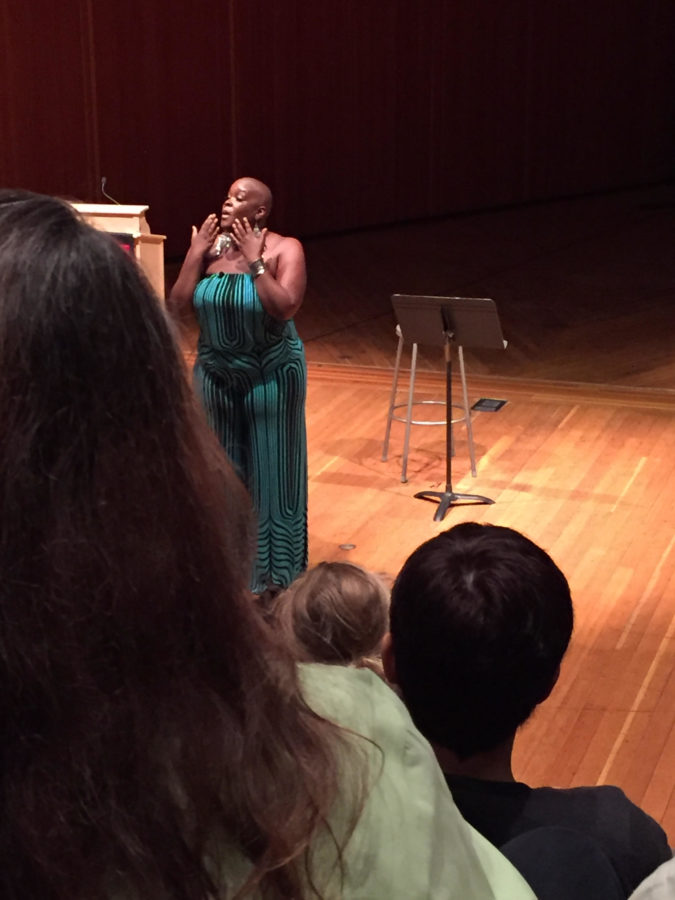Speaker Promotes Body Positivity Through Poetry
Margot McCrillis ’19 / The Dickinsonian
Sonya Renee Taylor presented on body positivity.
The international movement “The Body is Not an Apology” struck Dickinson when founder Sonya Renee Taylor challenged attendees of her poetry performance and lecture to practice radical self-love and body positivity in an event titled “Your Body is Not an Apology.”
Taylor performed her poetry and encouraged audience interaction, stopping to answer questions and explain performance poetry to the audience. Her evening presentation was followed by a workshop entitled “10 Tools for Radical Self-Love” the next day.
Professor of American studies and women’s, gender and sexuality studies Dr. Amy Farrell opened the event with a moment of silence in honor of Legacy Watkins ’18, a Dickinson student who passed away abroad in Cameroon earlier that day.
Student Project Manager, Aleksandra Syniec ’18, introduced Taylor, who greeted the audience with words of condolence for the college’s loss.
Taylor then set the tone for her lecture in a call and response style with the audience. She emphasized interaction and communion throughout the evening, stating that her performance was only as good as the audience’s energy. She shared poems about her experience abroad, discussed her unexamined privilege, violence against marginalized communities, her mother and the poem for which the movement is named.
“Students were captivated by [Taylor],” said Clarke Forum student supervisor Megan Magruder ’17. “The event was packed, and students immediately felt comfortable to participate along with [Taylor,] which made the overall experience more interactive.”
Taylor described the movement’s origins in response to a question posed by a student during a mid-lecture break. In a conversation with a fellow poet who had cerebral palsy and was concerned about an unplanned pregnancy, this woman revealed to Taylor that she had not asked for protection during sex because she felt her body was difficult to accept for any partner. For Taylor, this was the inspiration for the title of the movement: “Your Body is Not an Apology.”
Taylor then explained how, in the following weeks, she began to reflect on how she treated her own body. She found a photo taken of herself that she loved but had not posted for fear of negative response. She then decided to make it public. After receiving positive feedback, she created a Facebook group that has since grown into an organization with 26 employees in four countries.
The circumstance of people apologizing for their bodies is what motivated Taylor to post her photo, and is a key component of her strategy for change.
“There is nothing you can create in the world that is sustainable that you have not first created in yourself,” she said.
Taylor challenged the audience to acknowledge the ways in which people judge others’ bodies, and to work to combat those responses. Taylor attributed these automatic judgements as the products of socialization and an economy, which operates on “body terrorism,” the feeling of deficiency in oneself and perpetuating this culture by buying products marketed as solutions to that deficiency. She also pointed to the de-stigmatization of mental illness as an important objective.
Dr. Donna Bickford, director of the women and gender resource center said, “it was inspiring to hear Taylor talk about the connections between loving our bodies and other transformative social justice work.”
To the students in attendance Taylor said, “everything that you are doing if you allow yourself to be led is leading you to your highest calling.” This is a message that is drawn from her own varied career experiences. Taylor has received a degree in sociology, worked to provide AIDS education to sex workers and counseled at a wilderness camp for boys with behavioral issues.
To those beginning a practice of self-love from scratch, she said, “My favorite phrase is ‘fake it ‘till you make it.’ Doing a thing when you don’t really feel like doing a thing is still doing something.”
Student attendee Lydia Orr ’19 said of the performance, “Taylor says that change is created in discomfort, which means that sometimes we have to address things that make us uncomfortable but by addressing them we ignite change that could possibly start a ripple effect like her ‘The Body is Not an Apology’ movement.”
Taylor’s poetry performance and lecture was held in the Anita Tuvin Schlecter Auditorium at 7 p.m. on Feb. 23. The subsequent workshop was held on Friday, Feb. 24. The events were sponsored by the Clarke Forum, Student Life, the Women’s and Gender Resource Center, the Popel Shaw Center for Race and Ethnicity, the Office of LGBTQ Services and the departments of Sociology, Psychology, and Women’s, Gender & Sexuality Studies.






